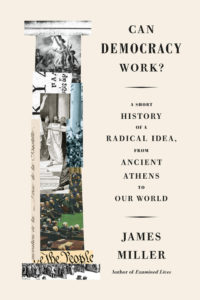In his book, Can Democracy Work? A Short History of a Radical Idea, From Ancient Athens to Our World, James Miller shows that democracy’s ascent is best seen not as a gradual unfolding of a political principle driven by reason and moral destiny but rather as a grand roller coaster ride of struggle, revolution, and backlash. Today’s populist outbursts look quite ordinary alongside this history, Princeton University’s G. John Ikenberry writes for Foreign Affairs:
Miller’s message is that democracy is not just a fixed set of governing institutions; it is, as the French political theorist Alexis de Tocqueville argued, a way of life. If democracy is to survive, the first imperative is to recognize its fragility and step forward and defend it.
 Nassim Nicholas Taleb’s 2012 bestseller Antifragile: Things That Gain from Disorder suggests that democratic resilience may be over-rated, notes Andy Smarick, the civil society, education, and work director at the . When we assess the strength of institutions, Antifragile tells us to look “beyond resilience or robustness,” he writes for The Weekly Standard. It’s not merely what a body can take or what it can dish out; antifragility is also about “post-traumatic growth.”
Nassim Nicholas Taleb’s 2012 bestseller Antifragile: Things That Gain from Disorder suggests that democratic resilience may be over-rated, notes Andy Smarick, the civil society, education, and work director at the . When we assess the strength of institutions, Antifragile tells us to look “beyond resilience or robustness,” he writes for The Weekly Standard. It’s not merely what a body can take or what it can dish out; antifragility is also about “post-traumatic growth.”
“Some things benefit from shocks,” Taleb writes. “They thrive and grow when exposed to volatility, randomness, disorder, and stressors.”
If fragility means something that breaks under stress, its exact opposite should mean something that grows stronger under pressure, The Economist adds.
The National Democratic Institute’s* Kenneth Wollack (above) tells PBS about the prospect of civil society amid incivility.
*A core institute of the National Endowment for Democracy







